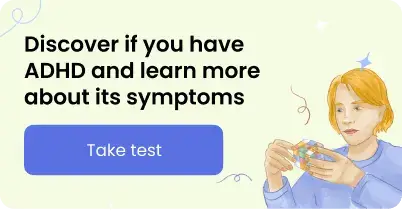Charles Darwin, Emily Dickinson, Richard Branson, and Thomas Jefferson. What do these famous people have in common?
Neurodiversity. This is one of the things that helped them to think out of the box.
While some of them openly talked about their differences in cognitive functions, scientists continue to develop theories about others. Anyway, all these people lived with symptoms of neurodivergence, which may have enabled them to bring unique perspectives to their fields.
But what does this phenomenon mean? And how does it manifest?
Keep reading to learn more about neurodivergent symptoms and the way they might influence your daily life.
What are Neurodivergent Traits?
To begin with, let’s identify the core terms and concepts.
Neurodivergent is a term that describes a person whose brain develops and works differently from what’s considered “typical”.
On the other hand, neurotypical people are those whose brain function doesn’t fall outside of what’s considered typical for our society.
Does it mean that one group is worse than another? Of course, no!
People who showcase symptoms of being neurodivergent face different challenges and have strengths that set them apart, offering unique abilities to enrich our world.
Moreover, these non-medical terms were created to highlight that there’s no “normal” or “abnormal” brain functioning. All differences are natural and can even empower the person.
Neurodivergent Brain Symptoms & Mental Health Conditions
It’s true that many people with neurodiversity also experience some developmental disorders. The most common ones include:
- Attention-deficit/hyperactivity disorder (ADHD)
- Autism and ADHD Overlap (AuDHD)
- Autism spectrum disorder (ASD)
- Dyslexia
- Dyspraxia
- Tourette syndrome
However, it isn’t a one-size-fits-all situation.
Ian Pearson, MA, BCBA, LBA, states, “Remember that neurodivergence exists on a spectrum! While you may not be “diagnosed”, people exist all across the spectrum, and it doesn’t mean that you can’t have symptoms, and ways to cope with those symptoms! At the end of the day, if you see yourself somewhere in this, just understand that you’re not alone, and that it’s okay to advocate for your needs and comfort!”
A person can live without any developmental disorder and still be neurodivergent. What’s more, some of us don’t even notice the signs of being neurodivergent and consider themselves neurotypical.
This only proves that there aren’t identical brains and their “normal” capabilities. Each one is different, and this is OK.
Nevertheless, if you feel that it’s challenging for you to cope with routine tasks and wonder if you live with neurodiversity, you can take our “Am I neurodivergent?” quiz.
Have you heard a lot about ADHD and suspect that you experience its symptoms? Then, we’ve got one more test that will provide you with insights about your well-being.
6 Neurodivergent Symptoms
So, we’ve reached the heart of the matter. Now, it’s high time to answer the question, “What are neurodivergent symptoms?” and check whether you experience something similar.
1. Sensory Sensitivities
Can’t understand “Why am I so sensitive?” and feel overwhelmed every time you enter a crowded store? This might be one of the signs of neurodivergence in adults.
But don’t jump to conclusions. Anyone can experience overstimulation because of bright light, loud noises, high or cold temperatures, etc. Everyone can feel uncomfortable at the end of a long day in a chaotic metro station.
Still, many neurospicy people (which is another term for people with neurodiversity) tend to experience overwhelm and face the challenges connected with it more often. While some don’t even notice such background distractions, for others, it can be like trying to find peace in a hurricane.
2. Emotional Intensity
Do you feel extremely sad when you hear even the slightest criticism at work? Or does anxiety take over when you have to speak in front of a group?
Next time, instead of asking yourself, “Why am I so emotional?” think about whether you experience neurodivergent symptoms in adults.
What else is typical for people with neurodiversity?
Emotional dysregulation is a hidden part of the ADHD iceberg. It means that you have difficulties controlling your emotional responses. It can have some of the most common manifestations.
- A shutdown is when a person becomes emotionally numb or detached in reaction to overwhelming stress or trauma.
- A meltdown is a response characterized by a loss of control. From anger outbursts to uncontrolled crying, this can make life more complicated.
3. Difficulty with Social Interactions
Symptoms of neurodivergent conditions often include challenges in socializing. Why does it happen?
In fact, about 15-20% of the global population experiences some form of neurodivergence. This means that there are more neurotypical people in society than you’d expect, and many aren’t diagnosed.
They “sneak by” because their type of communication is generally considered “normal.” Sometimes these traits are also typical in different cultures, further “hiding” the person from being seen as visibly neurodivergent!
For instance, neurodivergent people may find it difficult to:
- maintain eye contact
- understand nonverbal cues, such as facial expressions or body language
- engage in group conversations where multiple people are talking at once
- make small talk
- not interrupt during conversation
While some people may consider those with neurodivergent traits “rude”, in reality, they are often confused. In many situations, neurodivergents simply don’t understand this “game’s rules.”
It’s important to note that some people living with neurodiversity can mimic the behavior of their neurotypical peers and seem “normal.”
Nonetheless, this may lead to significant stress and anxiety as they continuously navigate social interactions that do not come naturally to them.

4. Executive Function Challenges
What are executive functions? It’s a combination of cognitive processes and mental skills that allow us to plan, concentrate, manage various tasks, and reach our goals.
Compromised executive functioning is one of the main neurodivergent child symptoms. Here are the most common challenges that people with neurodiversity may face:
- Poor time management, particularly difficulties with understanding how long a particular task will take
- Struggling to plan out things to work effectively
- Difficulty remembering instructions and details
- Poor multi-tasking skills
- Getting distracted easily
- Challenges in adapting to new situations or shifting focus
- “Time blindness” or losing track of how much time has passed
People living with neurodivergent ADHD symptoms may need more cognitive flexibility. Because of this, navigating day-to-day ups and downs can feel tough for them.
5. Hyperfixation or Difficulties with Concentration
There’s no middle ground: neurodivergents either get distracted super-easily or hyperfixate on specific interests for weeks.
One side of the coin is when a person struggles to concentrate, procrastinates, jumps between tasks without finishing them, and keeps asking, “Why can’t I focus?” This is particularly true for those with ADHD, but anyone with neurodiversity can have attention differences.
The other side of the coin is hyperfixation. When people with neurodivergent symptoms find something interesting, they can dwell on it for days, weeks, and even months. Whether knitting, watching TV series, or playing a computer game, any activity can become fully absorbing.
While it sounds pretty productive, in reality, people with hyperfixation can forget about anything else, from doing work tasks to eating or taking a shower.
Moreover, recovering from such an episode may feel like waking up from a deep, all-consuming trance that leaves a person disoriented.
6. Repetitive Behaviors or Interests
Self-stimulatory behavior (also called “stimming”) is a self-regulation mechanism. People who experience symptoms of being neurodivergent often use it to cope with emotions.
For instance, some people might engage in rhythmic hand-flapping, finding comfort in the repetitive motion. That might be a common sign for someone with ADHD stimming. Others may opt for meticulous routines, like arranging objects in precise order or compulsively checking things multiple times.
Rituals like taking the exact same route every day or eating foods in a particular sequence are also common.
Do you feel that some of these symptoms influence the quality of your life? Get a personalized 28-day plan for your wellness after taking a quick and free test from Breeze.
5 Beneficial Signs of Neurodivergence
Nevertheless, there are also many positive aspects of neurodivergence. These people have unique perspectives that can breathe fresh air in both personal and professional settings.
Let’s find out what strengths neurodivergents have and how they can bring diversity and innovation to the table of the modern world.
1. Ability to Stay Focused for Long Periods
Let’s remember Netflix’s series “The Queen’s Gambit.” The main character, Beth Harmon, lives with neurodivergent traits, including hyperfixation.
Beth has an all-consuming passion for chess, spending countless hours studying the game, visualizing chess moves, and practicing strategies. Impressively, how this intense focus contributes to her success in the chess world.
In reality, everything is quite similar.
Sometimes, extreme focus can feel like a blessing, not a curse. Those who experience neurodivergent ADHD symptoms can be highly concentrated on things they are interested in, which can lead to extraordinary achievements.
An essential skill here is to learn to hyperfocus rather than hyperfixate.
You should channel your concentration towards productive tasks with a clear goal in mind. In this case, people dive deep into something, driven by the desire to accomplish a goal. What’s more, for those who hyperfocus, the task shouldn’t necessarily be immediately enjoyable.
2. Outside-The-Box Thinking
“Neurodiversity may be the birthplace of some of humanity’s greatest minds.” — Harvey Blume, journalist.
An unconventional point of view is one of the most powerful signs signs of neurodivergence in adults and children. As the minds of neurodivergents work differently, they can come up with fresh solutions and ideas.
Just think about this fact! According to British psychiatrist Michael Fitzgerald, Albert Einstein and Isaac Newton could have Asperger syndrome, which is a form of high-functioning autism.
This means that thanks to their non-linear thinking, we now use the theory of relativity, mass-energy equivalence, laws of motion, and universal gravitation.
Usually, you can notice it even among neurodivergent toddler symptoms. Unique cognitive skills may cause kids to develop differently. While this may bring some problems to parents, it can also help a child in the future life.
3. Attention to Detail
How often do you have fuzzy thinking?
As we experience too many stressors and stimuli daily, staying focused can be difficult. And it can be even more complicated to notice minor details.
But neurodivergents live differently. Quite often, their observation skills and ability to recognize patterns can make them look like natural detectives. They can effortlessly spot nuances and connections that others might overlook.
As a result, neurodivergent brain symptoms open up great opportunities in various fields. From data analysis to engineering, from entrepreneurship to art and design — they can find their place in so many areas.
4. Empathy and Compassion
Have you ever seen the Netflix series “The Good Doctor”? Dr. Shaun Murphy is a surgical resident who has autism and savant syndrome. Despite facing skepticism and challenges in the medical profession, he is exceptionally empathetic towards his patients.
Shaun’s ability to see things differently, combined with high emotional intelligence, helps him foster deep connections with those he treats. As a result, he excels in his profession.
This works the same in real life. People living with neurodivergent traits can build strong and healthy relationships. Whether with friends, family, loved ones, or strangers on the streets, many of them are greatly warm-hearted.
5. Problem-Solving Skills
Last but not least. Do you have an issue? You can ask a neurodivergent how to solve it. The result may be surprising.
We’ve already talked about such neurodivergent symptoms as non-linear thinking and attention to detail. So, it’s vital to highlight the ability to look at problems from a different angle.
Imagine a situation. A family deals with the daunting task of organizing a cluttered garage. A neurotypical person might start by sorting through boxes, categorizing things, and planning where to place them.
Meanwhile, neurodivergents can approach the task with a fresh perspective and suggest ideas that others might overlook. It can be hanging bicycles from the ceiling to free up floor space or using shoe boxes to store gardening tools.
As you see, by thinking differently and embracing unconventional solutions, people with neurodivergent traits can succeed in business environments and bring groundbreaking advancements in various industries.
Disclaimer
This article is for general informative and self-discovery purposes only. It should not replace expert guidance from professionals.
Any action you take in response to the information in this article, whether directly or indirectly, is solely your responsibility and is done at your own risk. Breeze content team and its mental health experts disclaim any liability, loss, or risk, personal, professional, or otherwise, which may result from the use and/or application of any content.
Always consult your doctor or other certified health practitioner with any medical questions or concerns
Breeze articles exclusively cite trusted sources, such as academic research institutions and medical associations, including research and studies from PubMed, ResearchGate, or similar databases. Examine our subject-matter editors and editorial process to see how we verify facts and maintain the accuracy, reliability, and trustworthiness of our material.
Was this article helpful?





